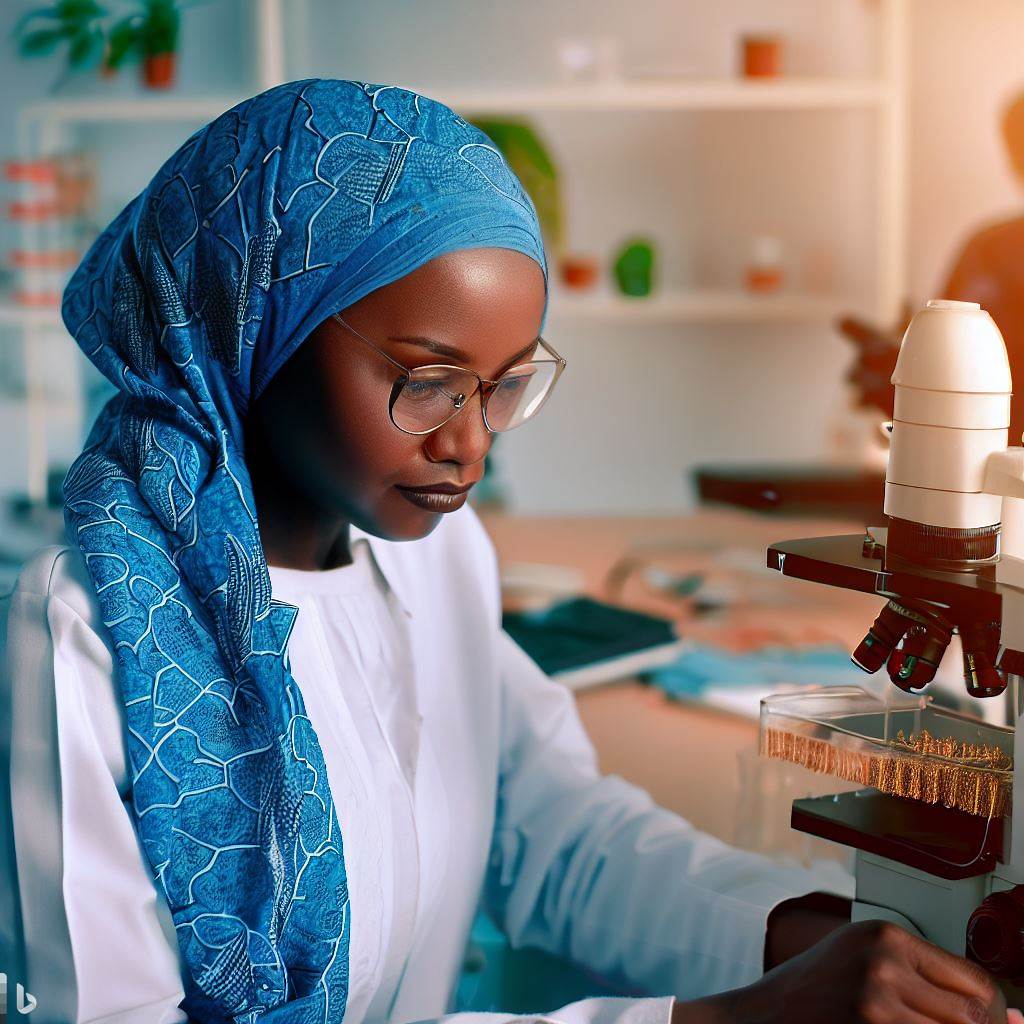Introduction
Animal geneticists play a crucial role in Nigeria’s agricultural sector by studying and manipulating the genes of animals for various purposes.
They are trained professionals who specialize in understanding and managing the genetics of animals.
These individuals work towards improving the overall quality, productivity, and health of livestock in the country.
Brief overview of animal geneticists
Animal geneticists are scientists who focus on studying the genetic makeup of animals. They investigate the inheritance patterns, variations, and traits that animals possess.
By analyzing genetic data, they can identify favorable traits and develop breeding programs to enhance those characteristics in livestock.
Additionally, animal geneticists also conduct research to understand the genetic causes of diseases in animals and develop strategies to mitigate them.
Importance of animal geneticists in Nigeria
Animal geneticists in Nigeria play a critical role in the development and improvement of the country’s animal agriculture sector.
By selectively breeding animals with desirable traits, they contribute to the productivity and profitability of the livestock industry.
Geneticists can enhance desired traits such as disease resistance, growth rate, milk production, and meat quality, leading to improved livelihoods for farmers and increased food production.
Furthermore, animal geneticists also help preserve indigenous breeds that are important for cultural, historical, and genetic diversity.
They ensure the conservation of rare or endangered livestock breeds and prevent the loss of valuable genetic resources that could be vital in the future.
These experts also contribute to the sustainability of livestock farming by promoting efficient resource use and reducing environmental impacts.
In the end, animal geneticists in Nigeria are essential for enhancing the productivity and sustainability of the livestock industry.
Their expertise in understanding and manipulating animal genetics plays a crucial role in improving the overall quality, health, and profitability of livestock farming in the country.
Furthermore, their work contributes to the preservation of indigenous breeds and the conservation of genetic resources, ensuring a diverse and sustainable agricultural sector.
The role of animal geneticists in Nigeria
Animal geneticists in Nigeria play a crucial role in several aspects related to livestock management and breeding. Their work has a significant impact on the country’s agricultural sector and overall food security.
Genetic improvement of livestock
One of the primary responsibilities of animal geneticists is to focus on the genetic improvement of livestock.
They employ selective breeding techniques to enhance the desirable traits of animals, such as improved growth rates or disease resistance.
By selecting the best individuals for breeding, they ensure that subsequent generations inherit the desired genetic characteristics.
Conservation of indigenous breeds
In addition to genetic improvement, animal geneticists also contribute to the conservation of indigenous breeds.
Nigeria is rich in a diverse range of indigenous livestock breeds, which are adapted to local conditions.
However, many of these breeds face the risk of extinction due to factors such as crossbreeding and changing market demands.
Animal geneticists work towards preserving the genetic diversity of these breeds and preventing their loss.
This conservation effort ensures the maintenance of unique genetic resources that may possess valuable traits for future breeding programs.
Disease resistance and control
Another essential role of animal geneticists is disease resistance and control. They conduct research to identify genetic markers associated with disease resistance in animals.
By understanding the genetic basis of disease resistance, they can selectively breed animals with enhanced immunity to certain diseases.
Additionally, animal geneticists actively collaborate with veterinary scientists to develop vaccines and treatments that can effectively combat prevalent diseases in livestock populations.
Enhancing productivity and efficiency
Animal geneticists focus on enhancing the productivity and efficiency of livestock production. They work towards improving growth rates, feed conversion efficiency, and overall productivity in animals.
For example, geneticists may select and breed animals that produce more milk or meat, thereby increasing the economic value of livestock farming.
The work of animal geneticists in Nigeria is essential for the sustainable development of the livestock sector.
Through their efforts, livestock farmers can access improved breeding stock, which leads to enhanced productivity and profitability.
Moreover, the conservation of indigenous breeds preserves genetic diversity and safeguards valuable traits for future agricultural needs.
In fact, animal geneticists play a significant role in Nigeria’s livestock industry.
Their work encompasses genetic improvement, conservation of indigenous breeds, disease resistance and control, as well as enhancing productivity and efficiency.
By actively engaging in these areas, animal geneticists contribute to the overall growth and sustainability of the country’s agricultural sector.
Read: Increasing Farm Productivity: Tips for Nigerian Farmers
Challenges faced by animal geneticists in Nigeria
Animal geneticists in Nigeria face numerous challenges that hinder their work and progress in this field.
These challenges range from limited resources and funding to cultural and traditional practices that impact their research and findings.
Limited resources and funding
A major challenge faced by animal geneticists in Nigeria is the limited availability of resources and funding.
This shortage of resources makes it difficult for researchers to carry out comprehensive studies and experiments.
Without sufficient funding, acquiring the necessary equipment and technologies becomes a significant hurdle.
Lack of advanced technology and infrastructure
In addition to limited resources, the lack of advanced technology and infrastructure poses a major challenge for animal geneticists.
Nigeria lags behind in terms of advanced laboratories, specialized equipment, and technological advancements in animal genetics.
This hinders the ability to conduct research on a large scale and limits the potential discoveries in the field.
Inadequate collaboration and communication
Another obstacle faced by animal geneticists is the inadequate collaboration and communication among researchers and institutions.
The lack of collaboration hampers the sharing of knowledge, data, and findings, preventing the advancement of animal genetics in Nigeria.
Improved collaboration can lead to better research outcomes, as well as more efficient use of limited resources.
Cultural and traditional practices
Cultural and traditional practices in Nigeria can impede the work of animal geneticists. Certain cultural beliefs and practices may hinder the acceptance or implementation of new genetic technologies.
This limits the scope of research and the potential for advancements in the field.
In essence, animal geneticists in Nigeria face numerous challenges including limited resources and funding, lack of advanced technology and infrastructure, inadequate collaboration and communication, and cultural and traditional practices.
Overcoming these challenges is crucial for the growth and development of animal genetics research in Nigeria.
Increased support and investment in the field can help alleviate these challenges and pave the way for scientific advancements and improved animal breeding practices in the country.
Read: Sustainable Practices for Agricultural Operations Managers in Nigeria
Training and education for animal geneticists in Nigeria
Academic programs and courses
Animal geneticists in Nigeria have access to various academic programs and courses to enhance their knowledge and skills. These programs typically include:
- Bachelor’s Degree in Animal Science: This program provides a solid foundation in animal genetics, breeding, and genomics.
- Master’s Degree in Animal Genetics: This program offers advanced courses in molecular genetics, quantitative genetics, and biotechnology.
- Ph.D. in Animal Genetics: For those aspiring to become experts in the field, a Ph.D. program focuses on genetics research, statistical analysis, and genetic modeling.
Practical training and internships
To complement their theoretical knowledge, animal geneticists in Nigeria engage in practical training and internships. These opportunities allow them to acquire hands-on experience in various areas, including:
- Genetics Laboratories: Animal geneticists work in labs to learn techniques such as DNA extraction, PCR, and gene sequencing.
- Animal Breeding Centers: They participate in breeding programs to study genetic traits, analyze pedigrees, and make informed breeding decisions.
- Field Research: Animal geneticists conduct field studies to collect samples, assess genetic diversity, and monitor population dynamics.
Collaborations with international institutions
Animal geneticists in Nigeria benefit from collaborations with international institutions, which expose them to cutting-edge research and methodologies. Collaboration opportunities include:
- Research Exchange Programs: Nigerian geneticists have the chance to visit renowned institutions abroad to learn from leading experts in animal genetics.
- Joint Research Projects: Collaborative projects with international institutions provide access to diverse genetic datasets and resources.
- Workshops and Conferences: Animal geneticists attend international workshops and conferences to present their research, network, and stay updated with advancements in the field.
Continuous professional development opportunities
Animal geneticists in Nigeria understand the importance of continuous learning and professional development. They avail themselves of various opportunities, such as:
- Training Workshops: Professional organizations conduct workshops on emerging techniques, tools, and software related to animal genetics.
- Online Courses: Geneticists can enroll in online courses to broaden their knowledge on specific topics and stay updated with advancements.
- Professional Networks: Joining national and international professional networks enables geneticists to connect with peers, share knowledge, and access resources.
In general, animal geneticists in Nigeria have several avenues for training and education, including academic programs, practical internships, collaborations with international institutions, and continuous professional development opportunities.
These initiatives support their endeavors in contributing to the understanding and improvement of animal genetics in Nigeria.
Read: Key Skills for Successful Animal Geneticists in Nigeria

Success stories and impact of animal geneticists in Nigeria
In Nigeria, animal geneticists have made significant strides in enhancing livestock productivity and preserving endangered breeds.
Their work has had a lasting impact on farmers, the economy, and the country as a whole.
Increased livestock productivity
One of the key contributions of animal geneticists is the increase in livestock productivity.
Through careful selection and breeding, these experts have helped farmers improve the quality and productivity of their livestock.
Numerous case studies have showcased the success of improved breeds in Nigeria. Farmers who have adopted these breeds have seen a boost in their economic returns.
For instance, increased milk yield and improved meat quality have directly translated into higher incomes for farmers.
Additionally, the resistance to diseases in these improved breeds has reduced the need for medication and veterinary intervention, further benefiting farmers financially.
Preservation of endangered breeds
Animal geneticists have not limited their efforts to increasing productivity alone. They have also taken strides in preserving endangered breeds.
Nigeria is home to several unique and culturally significant livestock breeds that were on the verge of extinction.
Thanks to the conservation efforts of animal geneticists, some of these breeds have been successfully protected and maintained.
The Nigerian Dwarf Goat, known for its small size and high milk production, is one such breed. The Kuri cattle breed, known for its adaptability to arid environments, is another example.
By preserving these breeds, animal geneticists have safeguarded Nigeria’s cultural heritage and maintained ecological diversity.
The significance of preserving these endangered breeds goes beyond their cultural value.
They possess genetic traits that can be vital for future breeding programs and adaptation to changing environmental conditions.
Animal geneticists have employed advanced breeding techniques such as artificial insemination and embryo transfer to maintain and improve the genetic diversity of these breeds.
By utilizing such techniques, they ensure that the unique genetic assets of these breeds are not lost and can contribute to future livestock breeding programs.
Basically, animal geneticists in Nigeria have had a significant impact on both livestock productivity and breed preservation.
Their work has resulted in improved breeds, higher economic returns for farmers, and the conservation of endangered breeds with cultural and ecological significance.
The efforts of animal geneticists continue to contribute to the development and sustainability of Nigeria’s livestock industry.
Read: Breaking Into the Animal Geneticist Field in Nigeria
Future prospects and recommendations
Investing in research and technology
Nigeria should allocate more funds towards animal genetic research and technology development. Increased investment will lead to improved understanding of animal genetics and better breeding programs.
Advanced technology can facilitate genetic mapping, breeding selection, and disease resistance in livestock.
Strengthening collaborations and partnerships
Collaborating with international organizations and universities will enhance knowledge exchange and expertise.
Partnerships can lead to the implementation of global best practices and the adoption of cutting-edge genetic techniques.
Sharing resources and data can accelerate research and development in animal genetics.
Promoting awareness and policy support
Government and non-governmental organizations should raise awareness about the importance of animal genetics.
Policymakers need to develop supportive policies and regulations to promote sustainable animal breeding practices.
Public campaigns can educate farmers and animal breeders about the benefits of genetic improvement.
Encouraging youth involvement in animal genetics
Young individuals should be encouraged to pursue careers in animal genetics through scholarships and training programs.
Promoting internships and mentorship opportunities can provide hands-on experience and skill development.
Youth involvement will drive innovation and ensure the continuity of animal genetic research and practices.
All in all, the role of animal geneticists in Nigeria is vital for sustainable agricultural practices and food security.
Investing in research and technology, strengthening collaborations, promoting awareness and policy support, and encouraging youth involvement are crucial pillars for the future success of animal genetics in Nigeria.
By prioritizing these recommendations, Nigeria can unlock the full potential of its animal genetic resources and contribute to the overall development of its agricultural sector.
Conclusion
Animal geneticists play a crucial role in Nigeria, contributing to the development and improvement of livestock.
Despite challenges such as lack of resources and infrastructure, potential solutions include collaboration and investment.
It is essential to encourage and support further advancements in the field, promoting research and knowledge-sharing to enhance Nigeria’s animal genetics sector.
Recap:
- Breed Improvement
- Disease Resistance
- Sustainable Production
- Biodiversity Conservation
Challenges: Limited resources, technology gaps. Solutions: Training, research collaboration, policy support.
Forge ahead. Invest in research, technology, and collaboration. Secure healthier, more resilient livestock and a prosperous future.




